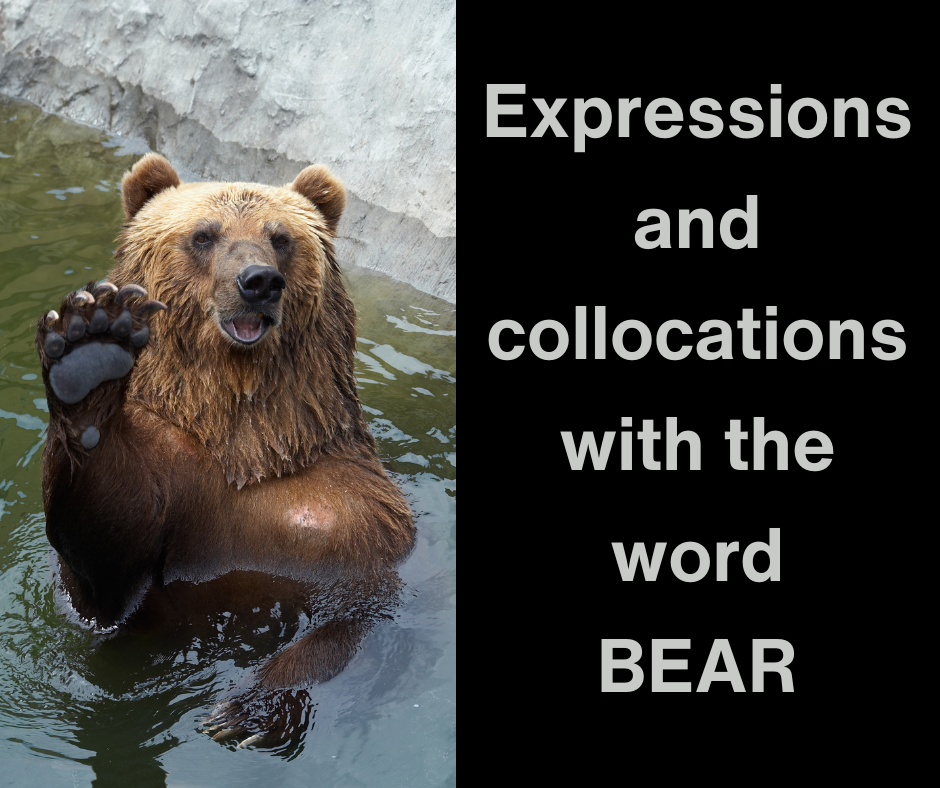
In today’s podcast, you’ll learn different uses of the word bear. So bear with us as we look at some expressions and collocations with the word ‘bear’.
Email from Mati from Cartagena in Murcia.
First of all, I would like to congratulate you for all the work you do. Thanks to you, I’m one more member of the aircoholic community!
Due to the fact I work as a tourist guide, I find speaking easy and as I wanted to keep my writing skills, I wrote this email! However, my target nowadays is to reach a C1 level in every task, but I need discipline.
By the way, you are invited to come to the city if you have time, having the opportunity to taste a “caldero” to discover what is an “asiatico” to find out what is an “explorador” and to enjoy our heritage.
I recently travelled to Valencia to visit my relatives and during the journey I listened to some podcasts related to music. Since then, I have been thinking about, if Reza could play a piece of music with his violin. I´m sure that it will be a lovely present for all the listeners!
PD: I hope not to have many mistakes, it is difficult to write when you have a cat messing around the computer.
Cheers and have a nice week!
Expressions with ‘bear’
Bare means “naked,” but to Bear is to carry something.
Women bear children. They give birth to a child. We use it in the passive when we say ‘I was born’ (by my mother – but that’s obvious!)
“After nine months of pregnancy, Maria was happy to finally bear a healthy child.”
Bear is an irregular verb: bear – bore – born/borne
e.g.“The three delinquents all bore (PAST) responsibility for the robbery equally”
Grin and bear it: Endure a difficult or unpleasant situation with a smile.
“It’s a tough task, but we’ll have to grin and bear it.”
Bear with me: Be patient or tolerate a situation.
“Bear with me while I find the information you requested.”
Like a bear with a sore head: Someone who is in a bad mood or easily irritated.
“Don’t talk to him right now; he’s like a bear with a sore head.”
Bear the brunt: To endure the worst part of a difficult situation.
“The small towns near the epicenter bore the brunt of the earthquake.”
Bear in mind: Remember or take into consideration.
“When making decisions, bear in mind the consequences.”
Can’t bear the sight of: Strongly dislike or be unable to tolerate something.
“I can’t bear the sight of spiders; they terrify me.”
Bear the load/burden: To carry a heavy responsibility or obligation.
“As the team leader, he had to bear the burden of decision-making.”
Bear fruit: To produce positive results or outcomes.
“The research project took years, but finally, it began to bear fruit.”

https://www.englishcraig.com/
Bear witness to: To be able to prove that something is true.
“These spectators have born(e) witness to a new Olympic world record today!”
Bear a cross: To have to put up with something unpleasant or annoying.
“Listening to my noisy neighbours shouting every night is a cross I must bear.”
Bear the consequences: To accept or face the results of one’s actions.
“If you break the rules, you’ll have to bear the consequences.”
The right to bear arms: The legal entitlement to own and carry firearms.
“It is my constitutional right to bear arms”
To bear a grudge against someone: to hold a long-lasting resentment.
“I don’t bear any grudges against my ex-wife.”
“To bear a (striking) resemblance to: Looks very similar to someone or something else.
“You bear a striking resemblance to George Clooney, Mr. Wealand.”
Bear right/left (at): Take a specific direction.
“Bear right at the fork.”
To bear up: “How are you bearing up?”: How are you coping or managing?
Bear down on: To exert pressure or focus intensely on something.
“The storm began to bear down on the coastal areas, leading to evacuations.”
Bear the scars of: To show lasting signs or effects of a past experience.
“She bore the scars of the accident both physically and emotionally.”
…and now it’s your turn to practise your English. Who do you bear a resemblance to? Is listening to this podcast bearing any fruit? What is it important to bear in mind when you are studying English?
Send us a voice message. https://www.speakpipe.com/inglespodcast
Send us an email with a comment or question to [email protected] or [email protected]
If you’re a Spanish speaker and you want to study for free, visit the mansioningles website and for paid eBooks and audios for self-study check out the online store: https://store.mansioningles.net/
Thank you to our Patreon supporters. Join our Patreon program for as little as $1.50 per month and you get instant access to the transcriptions of this podcast. https://www.patreon.com/inglespodcast
Welcome to our new Patreon supporters who have joined us this month:
Josmar de Brito
Fran Otero
Oscar
David La Pietra
Juan
Alejandro
In next week’s episode: Gradable and Ungradable Adjectives
If you enjoyed this podcast, please tell your friends.
The music in this podcast is by Pitx. The track is called ‘See You Later’



